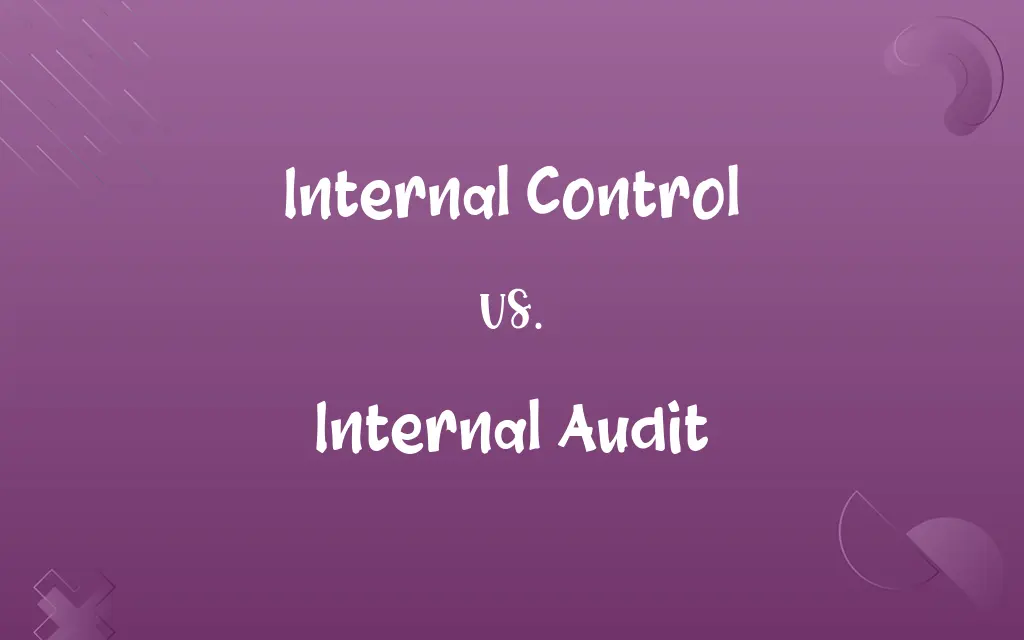Internal Control vs. Internal Audit: Know the Difference

By Shumaila Saeed || Published on January 25, 2024
Internal Control is a process for assuring organizational objectives, while Internal Audit is an independent assessment of the effectiveness of these controls.

Key Differences
Internal Control comprises the policies and procedures that a business implements to safeguard its assets, ensure accurate and reliable financial reporting, and comply with applicable laws and regulations. In contrast, Internal Audit is a function that provides independent and objective evaluation of the effectiveness of risk management, control, and governance processes in an organization.
Shumaila Saeed
Jan 25, 2024
Internal Control is a continuous process, integrated into daily activities, and is primarily the responsibility of management and employees within the organization. Conversely, Internal Audit is typically a periodic activity conducted by a separate, independent unit within the organization, reporting typically to the highest level of management and the board of directors.
Shumaila Saeed
Jan 25, 2024
Internal Control aims to prevent, detect, and correct errors and irregularities, whereas Internal Audit evaluates whether the existing controls are adequate and functioning effectively, and recommends improvements where necessary.
Shumaila Saeed
Jan 25, 2024
Internal Control systems are designed to address specific risks faced by the organization, encompassing both financial and operational controls. Internal Audit, however, takes a broader view, assessing whether the overall control environment is effective in managing risks, including those related to financial reporting and compliance.
Shumaila Saeed
Jan 25, 2024
Internal Control focuses on the implementation and effectiveness of specific controls within processes, while Internal Audit provides an overall assessment and assurance on the entire spectrum of controls, encompassing operational, financial, and compliance aspects.
Shumaila Saeed
Jan 25, 2024
ADVERTISEMENT
Comparison Chart
Primary Focus
Implementation and maintenance of control processes
Independent evaluation of control processes
Shumaila Saeed
Jan 25, 2024
Responsibility
Management and employees within the organization
Separate, independent audit function within the organization
Shumaila Saeed
Jan 25, 2024
Objective
Prevent, detect, and correct errors and irregularities
Provide assurance on risk management and control effectiveness
Shumaila Saeed
Jan 25, 2024
Frequency
Continuous, integrated into daily activities
Periodic, based on audit plans
Shumaila Saeed
Jan 25, 2024
Scope
Specific processes and controls within the organization
Broad, encompassing all organizational controls
Shumaila Saeed
Jan 25, 2024
ADVERTISEMENT
Internal Control and Internal Audit Definitions
Internal Control
Internal Control is the process by which an organization's resources are directed, monitored, and measured.
The new software enhances internal control by tracking inventory in real-time.
Shumaila Saeed
Jan 05, 2024
Internal Audit
Internal Audit involves evaluating an organization's internal controls, corporate governance, and accounting processes.
The internal audit revealed deficiencies in the financial reporting process that were promptly addressed.
Shumaila Saeed
Jan 05, 2024
Internal Control
Internal Control is a systematic process for achieving an organization's objectives in operational effectiveness, reliable reporting, and compliance with laws.
The company's internal control system includes regular financial audits to ensure accuracy in reporting.
Shumaila Saeed
Jan 05, 2024
Internal Audit
Internal Audit is an independent, objective assurance activity designed to add value and improve an organization's operations.
The internal audit team's report led to significant improvements in the company's risk management practices.
Shumaila Saeed
Jan 05, 2024
Internal Control
Internal Control refers to the mechanisms, rules, and procedures implemented by a company to ensure the integrity of financial and accounting information.
Effective internal control measures prevent unauthorized access to financial records.
Shumaila Saeed
Jan 05, 2024
ADVERTISEMENT
Internal Audit
Internal Audit is a consulting activity aimed at improving an organization’s governance, risk management, and control processes.
Through internal audit, the company identified opportunities to streamline its operations.
Shumaila Saeed
Jan 05, 2024
Internal Control
Internal Control encompasses policies and procedures that protect a company's assets from misuse.
Implementing stringent internal control helped the company reduce instances of asset misappropriation.
Shumaila Saeed
Jan 05, 2024
Internal Audit
Internal Audit assesses the effectiveness of risk management, control, and governance processes in an organization.
The internal audit function played a key role in reinforcing the company's governance framework.
Shumaila Saeed
Jan 05, 2024
Internal Control
Internal Control involves the methods and procedures used to ensure compliance with laws and regulations.
The firm's internal control procedures include compliance checks to adhere to regulatory standards.
Shumaila Saeed
Jan 05, 2024
Internal Audit
Internal Audit provides independent and objective insight into an organization’s culture, policies, and procedures.
The insights from internal audit helped the company align its policies with best practices.
Shumaila Saeed
Jan 05, 2024
Repeatedly Asked Queries
How does Internal Control help in risk management?
Internal Control helps in risk management by providing mechanisms to identify, assess, and manage risks impacting the organization's objectives.
Shumaila Saeed
Jan 25, 2024
Is Internal Control a continuous process?
Yes, Internal Control is a continuous process integrated into the daily activities of an organization.
Shumaila Saeed
Jan 25, 2024
What is the primary purpose of Internal Control?
The primary purpose of Internal Control is to safeguard assets, ensure financial reporting accuracy, and comply with laws and regulations.
Shumaila Saeed
Jan 25, 2024
How often does Internal Audit occur?
Internal Audit occurs periodically, based on a planned schedule or as needed.
Shumaila Saeed
Jan 25, 2024
Can a strong Internal Control system eliminate the need for Internal Audit?
No, even with a strong Internal Control system, Internal Audit is necessary for independent assurance and objective assessment.
Shumaila Saeed
Jan 25, 2024
Who is responsible for Internal Control?
Internal Control is primarily the responsibility of management and employees within the organization.
Shumaila Saeed
Jan 25, 2024
Can Internal Audit recommend changes to internal controls?
Yes, Internal Audit can recommend changes to improve the effectiveness of internal controls.
Shumaila Saeed
Jan 25, 2024
Does Internal Audit only focus on financial aspects?
No, Internal Audit assesses various aspects including operational, financial, and compliance controls.
Shumaila Saeed
Jan 25, 2024
What are the main components of Internal Control?
The main components of Internal Control include control environment, risk assessment, control activities, information and communication, and monitoring.
Shumaila Saeed
Jan 25, 2024
What is the role of Internal Audit?
The role of Internal Audit is to provide independent and objective evaluation of the organization's internal controls, risk management, and governance processes.
Shumaila Saeed
Jan 25, 2024
How does technology impact Internal Control and Internal Audit?
Technology plays a key role in enhancing the efficiency, accuracy, and coverage of both Internal Control and Internal Audit processes.
Shumaila Saeed
Jan 25, 2024
Who does the Internal Audit function report to?
The Internal Audit function typically reports to the highest level of management and the board of directors.
Shumaila Saeed
Jan 25, 2024
How do Internal Control and Internal Audit work together?
Internal Control establishes the processes for risk management and control, while Internal Audit independently evaluates and verifies the effectiveness of these processes.
Shumaila Saeed
Jan 25, 2024
What skills are important for professionals in Internal Control and Internal Audit?
Important skills include analytical thinking, knowledge of accounting and finance, understanding of business processes, and communication skills.
Shumaila Saeed
Jan 25, 2024
Are Internal Control and Internal Audit required by law?
The requirement for Internal Control and Internal Audit varies by jurisdiction and industry, but they are generally recommended best practices.
Shumaila Saeed
Jan 25, 2024
Can Internal Control and Internal Audit improve organizational performance?
Yes, effective Internal Control and Internal Audit can significantly contribute to improved operational efficiency, risk management, and overall organizational performance.
Shumaila Saeed
Jan 25, 2024
Are Internal Control and Internal Audit the same?
No, Internal Control and Internal Audit are distinct but complementary functions within an organization.
Shumaila Saeed
Jan 25, 2024
Is Internal Audit only applicable to large organizations?
No, Internal Audit is applicable to organizations of all sizes, although its structure and focus may vary.
Shumaila Saeed
Jan 25, 2024
Can Internal Audit make decisions for management?
No, Internal Audit provides recommendations, but decision-making remains the responsibility of management.
Shumaila Saeed
Jan 25, 2024
Can Internal Audit investigate suspected fraud?
Yes, Internal Audit can investigate suspected fraud as part of evaluating the effectiveness of internal controls.
Shumaila Saeed
Jan 25, 2024
Share this page
Link for your blog / website
HTML
Link to share via messenger
About Author
Written by
Shumaila SaeedShumaila Saeed, an expert content creator with 6 years of experience, specializes in distilling complex topics into easily digestible comparisons, shining a light on the nuances that both inform and educate readers with clarity and accuracy.








































































